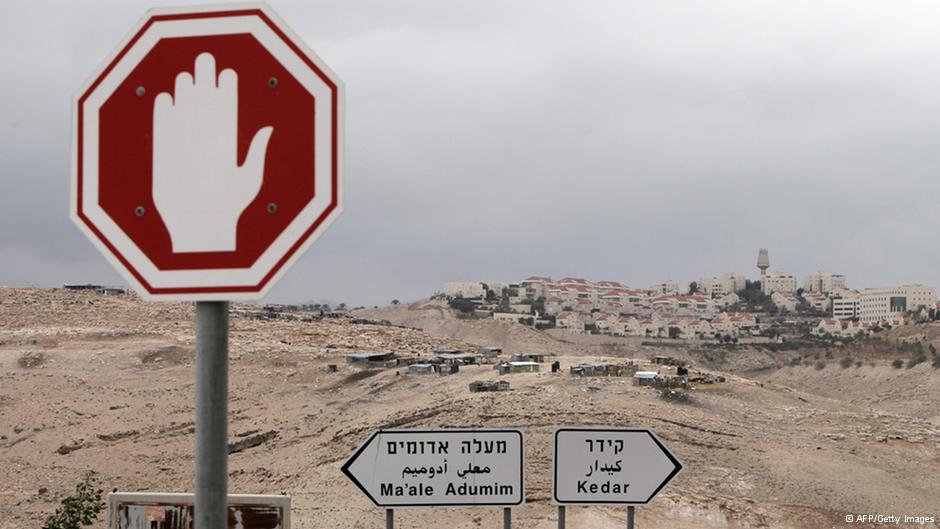 Private European businesses play a major role in funding, facilitating and supporting Israeli violations of international law and illegal Israeli settlements in three main ways:
Private European businesses play a major role in funding, facilitating and supporting Israeli violations of international law and illegal Israeli settlements in three main ways:
I. Providing products and services that facilitate the existence of illegal settlements
French multinational Veolia operates transport, waste and water infrastructure for illegal Israeli settlements, including the Jerusalem Light Rail, built to connect illegal Israeli settlements to Israel and facilitate the expansion of settlements.1
British security company G4S provides security services and equipment to Israeli checkpoints, Israel’s illegal separation wall and private businesses in illegal Israeli settlements, including in East Jerusalem. The company also helps Israel to operate prisons at which Palestinians, including children, are held without trial and subjected to torture.2
The Swedish Volvo Group and British firm JCB supply bulldozers and earth moving vehicles to Israel that are used by the Israeli government to demolish Palestinian homes, including in East Jerusalem.3
A subsidiary of Irish company CRH provides cement to Israel used in the construction of Israel’s illegal separation wall.4
Italian company Pizzarotti and Swedish firm Atlas Copco are both involved in the construction of the illegal Israeli A1 rail project, which passes through occupied Palestinian territory and is causing displacement of Palestinians.5
II. Importing and selling goods produced by companies operating in illegal Israeli settlements
European businesses also support illegal Israeli settlements by importing and selling goods from companies operating in them. Many major European retailers import produce from companies operating in illegal Israeli settlements such as Mehadrin, SodaStream and Ahava. Israeli export companies soch as Mehadrin and SodaStream play a key role in the appropriation of Palestinian land, water and other natural resources. Many illegal Israeli settlements, especially in the Jordan Valley area, are only economically viable because the businesses that operate in them are able to export to European markets.
Many Israeli exporters, including Mehadrin, SodaStream and Ahava have been proven to routinely mislead retailers and consumers about the true origin of goods manufactured in illegal Israeli settlements, making it difficult for retailers to avoid selling settlement produce without cutting ties with certain Israeli exporters altogether and making accurate labeling of Israeli products unworkable.6
III. Investing in settlement companies and projects
Partially state-owned Belgian bank Dexia provides long-term loans and other financial services used by Israeli municipal authorities to facilitate the construction of illegal Israeli settlements.7 Many European banks hold shares and provide loans to companies based or operating in illegal Israeli settlements. For example, UK bank Barclays holds a significant stake in British Israel Investments, a real estate company that owns extensive amounts of property in illegal Israeli settlements.8
2.The duty of states to prevent businesses contributing to violations of international law and human rights
According to international law as applied in the 2004 International Court of Justice advisory opinion on Israel’s wall and settlements, third party states are violating their own obligations to not recognize nor render aid or assistance to these serious Israeli violations by allowing financial and economic activity with the settlements to continue.9
Palestinian human rights organization Al Haq has published a legal analysis arguing that states are legally obliged to end trade with companies operating in illegal Israeli settlements. Al Haq argue that by allowing settlement trade, states “implicitly recognise as legal a situation arising from a breach of peremptory norms of international law and thus violate their duty of non- recognition” and that “in addition, by engaging in the trade of settlement produce, States are failing to comply with their obligation to actively cooperate in order to put the Israeli settlement enterprise to an end”.10 An academic study published in the major peer-reviewed Journal of International Humanitarian Legal Studies recently reaffirmed and expanded upon this analysis.
The UN Guiding Principles on Business and Human Rights, supported by the EU and adopted by the UN Human Rights Council, explain that states must ensure businesses respect human rights and international humanitarian law. The Guiding Principles urge states to provide information to help businesses avoid contributing to human rights abuses arising from conflict and to provide “adequate assistance to business enterprises to assess and address the heightened risks of abuses” in conflict areas. The Principles also urge states to withdraw support and not procure services from companies that persistently violate human rights.11
The 2012 EU Heads of Mission report urged the EU and member states to “prevent, discourage and raise awareness about problematic implications of financial transactions, including foreign direct investments, from within the EU in support of settlement activities, infrastructure and services”.12
In September 2012, the UN General Assembly adopted a report on corporate complicity related to the illegal Israeli settlements by Richard Falk, the UN Special Rapporteur on the situation of human rights in the Palestinian territories occupied since 1967. The report urges states to take steps to hold businesses accountable for their participation in Israeli violations of international law and to take steps to end business involvement in illegal Israeli settlements.13
In dialogue with Richard Falk, the EEAS stated that it believed that “The EU believes that the Guiding Principles on business and human rights need to be applied globally and calls on European companies to implement the Guiding Principles in all circumstances, including in Israel and occupied Palestinian territory.”14
In March 2013, UN Human Rights Council adopted the report of the Independent Fact Finding Mission on the Israeli settlements. The Fact Finding Mission affirmed that involvement in settlement activities falls under the jurisdiction of the ICC and may result in criminal responsibility. Concluding that businesses have “enabled, facilitated and profited from the construction and growth of the settlements,” the Mission urges states to take “appropriate measures” to prevent businesses contributing to human rights abuses related to the illegal Israeli settlements.15
While the recent guidelines prohibiting public EU funds from being allocated to projects and entities in illegal Israeli settlements should be welcomed and implemented fully, these guidelines are being severely undermined by the large scale of economic relations between European businesses.
3. Examples of good practice
In general, European governments are not taking sufficient steps to prevent risks and problems associated with financial and economic engagement in illegal Israeli settlement activities in the occupied Palestinian territory. There are however some examples of good practice:
The Dutch government recently intervened to discourage engineering firm Royal Haskoning DHV from participating in a sewage treatment project with the Israeli municipality in occupied East Jerusalem. The company heeded the Dutch government’s advice and withdrew from the project.16
The Dutch government has also made public statements advising businesses to avoid business relationships with illegal Israeli settlements. In a written statement to Parliament in May 2013, the Dutch foreign minister Frans Timmermans indicated that the Dutch government discourages financial relationships with illegal Israeli settlements. He said: “Although not prohibited, economic relations between Dutch companies and companies in the settlements in the occupied territories are discouraged by the Dutch government.”
In February 2011, the German transport minister wrote to Deutsche Bahn to express opposition to its involvement in an Israeli train project that cuts through the occupied West Bank. Deutche Bahn ended its involvement in the project shortly after.17
In March 2013, German foreign ministry officials directly informed representatives from a Palestinian civil society organisation that the German government had issued guidance to all German universities discouraging them from having any relations with Ariel University, a colony-college built in the settlement of Ariel in the occupied Palestinian territory.
4. Recommendations
In order to meet their legal obligations and commitment to the implementation of the UN Guiding Principles on Businesses and Human Rights and ensure that businesses do not undermine EU policy on Israeli settlements, the European Union and its member states should proactively advise businesses to:
Cease all trade with Israeli export companies that operate inside illegal Israeli settlements, since trade with such companies provides capital to businesses involved in the maintenance and expansion of Israeli settlements
Avoid involvement or investment in the provision of infrastructure products and services to illegal Israeli settlements such as transport, waste and environmental services, given that such projects violate international law
End all investment in companies, projects and businesses operating inside illegal Israeli settlements, including by divesting existing investments
Be aware of the risk of legal action against the business for breaches of international law
In addition, the European Union should:
Conduct a Human Rights Impact Assessment of its trade agreements with Israel, given that companies operating in illegal Israeli settlements are able to export produce to Europe using procedures put in place by these agreements.
Encourage its member states to withdraw state support from and not procure services from companies that refuse to address their contribution to human rights violations.
——
1 http://www.whoprofits.org/company/veolia-environnement
2 www.addameer.org/etemplate.php?id=460 http://stopadcampaign.com/?p=271
3 http://www.whoprofits.org/company/volvo-group http://www.waronwant.org/attachments/JCB%20Briefing.pdf
4 http://www.ipsc.ie/campaigns/crh-divest
5 http://www.whoprofits.org/company/impresa-pizzarotti-c
7 http://www.whoprofits.org/company/dexia-group
8 http://corporateoccupation.files.wordpress.com/2012/01/targeting-israeli-apartheid-jan-2012.pdf p 292
11 http://www.business-humanrights.org/UNGuidingPrinciplesPortal/TextUNGuidingPrinciples
12 https://www.eccpalestine.org/wp-content/uploads/2013/02/EU_Homs_Jerusalem_Report_2012-1.pdf
13 http://www.un.org/apps/news/story.asp?NewsID=43376#.UZH-eSvWyqw
15 http://www.ohchr.org/Documents/HRBodies/HRCouncil/RegularSession/Session19/FFM/FFMSettlements.pdf
17 http://www.bdsmovement.net/2011/ramsauer-6986
